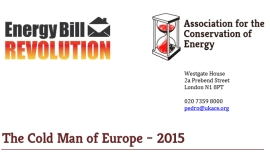The cold man of europe 2015
In October 2015, the Association for the Conservation of Energy (ACE) published a briefing paper; The Cold Man of Europe – 2015, How the UK’s housing performs against comparable European countries in terms of fuel poverty and energy efficiency. It was written by Pedro Guertler, Jack Carrington and Antonia Jansz and followed the 2013 publication of Fact-file: The Cold Man of Europe, which found that fuel poverty was a major social crisis in the UK.
The paper sets the scene by explaining that the UK housing stock is the cause of 29% of our CO2 emissions and 27% of our final energy consumption, and that an estimated 4.5 million households are in fuel poverty.
It goes on to compare fuel poverty and the state of the housing in 16 European countries:
- Austria
- Belgium
- Czech Republic
- Denmark
- Finland
- France
- Germany
- Iceland
- Ireland
- Luxembourg
- Netherlands
- Norway
- Slovenia
- Sweden
- Switzerland
- UK
The paper found that the UK performed worst across a range of indicators:
- The UK ranked 14th out of 16 for affordability of space heating and fuel poverty despite having one of the lowest energy prices.
- Out of 11 countries for which energy efficiency data was available, the UK’s walls ranked 7th, roofs ranked 8th, floors ranked 10th and windows ranked 11th.
- The UK ranked 12th out of 16 in terms of households reporting their home was in a poor state of repair.
It suggested that this poor state of repair was the main cause of these problems. Out of 26 million households in the UK, 21 million have a band D, E, F or G Energy Performance Certificate. G-rated homes have double the energy expenditure of the national average.
The paper proposed that, ‘The solution to this crisis is for the UK Government to designate home energy efficiency as an infrastructure priority and use infrastructure funds to deliver the stable, long-term investment needed to implement a locally-led infrastructure programme to upgrade all UK homes up to Band C on an Energy Performance Certificate.’
[edit] Related articles on Designing Buildings
- A measure of net well-being that incorporates the effect of housing environmental impacts.
- Adapting 1965-1980 semi-detached dwellings in the UK to reduce summer overheating and the effect of the 2010 Building Regulations.
- Anatomy of low carbon retrofits: evidence from owner-occupied superhomes.
- Decent homes standard.
- Energy companies obligation ECO.
- Excess cold.
- Fuel poverty.
- Green deal scrapped.
- Heat Energy: The Nation’s Forgotten Crisis.
- Housing contribution to regeneration.
- Quantifying the health benefits of the Decent Homes programme FB 64.
- The real cost of poor housing.
- Transitioning to eco-cities: Reducing carbon emissions while improving urban welfare.
- Well-being and regeneration: Reflections from Carpenters Estate.
- Wellbeing.
Featured articles and news
A case study and a warning to would-be developers
Creating four dwellings for people to come home to... after half a century of doing this job, why, oh why, is it so difficult?
Reform of the fire engineering profession
Fire Engineers Advisory Panel: Authoritative Statement, reactions and next steps.
Restoration and renewal of the Palace of Westminster
A complex project of cultural significance from full decant to EMI, opportunities and a potential a way forward.
Apprenticeships and the responsibility we share
Perspectives from the CIOB President as National Apprentice Week comes to a close.
The first line of defence against rain, wind and snow.
Building Safety recap January, 2026
What we missed at the end of last year, and at the start of this...
National Apprenticeship Week 2026, 9-15 Feb
Shining a light on the positive impacts for businesses, their apprentices and the wider economy alike.
Applications and benefits of acoustic flooring
From commercial to retail.
From solid to sprung and ribbed to raised.
Strengthening industry collaboration in Hong Kong
Hong Kong Institute of Construction and The Chartered Institute of Building sign Memorandum of Understanding.
A detailed description from the experts at Cornish Lime.
IHBC planning for growth with corporate plan development
Grow with the Institute by volunteering and CP25 consultation.
Connecting ambition and action for designers and specifiers.
Electrical skills gap deepens as apprenticeship starts fall despite surging demand says ECA.
Built environment bodies deepen joint action on EDI
B.E.Inclusive initiative agree next phase of joint equity, diversity and inclusion (EDI) action plan.
Recognising culture as key to sustainable economic growth
Creative UK Provocation paper: Culture as Growth Infrastructure.
Futurebuild and UK Construction Week London Unite
Creating the UK’s Built Environment Super Event and over 25 other key partnerships.
Welsh and Scottish 2026 elections
Manifestos for the built environment for upcoming same May day elections.
Advancing BIM education with a competency framework
“We don’t need people who can just draw in 3D. We need people who can think in data.”

























